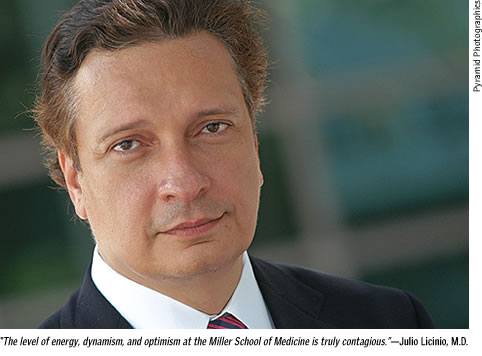
Just weeks after taking over as the new chairman of the
Department of Psychiatry and Behavioral Sciences, Julio Licinio,
M.D., was making headlines in South Florida and around the
world about his new study, which suggests the use of antidepressants
to treat depression has saved thousands of lives. The findings,
published in the June 2006 edition of the peer-reviewed journal
PLoS Medicine, were detailed by more than two dozen different
media outlets, including ABC News, El Nuevo Herald, and international
news service reports.
“Our findings certainly suggest that the introduction
of SSRIs has contributed to the reduction of suicide rates
in the United States,” says Licinio. “However,
the findings do not preclude the possibility of increased
risk of suicide among small populations of individuals.”
The pharmacogenomics of antidepressants, or understanding
the genetic basis for why some people respond to medication
and others do not, is one of his main areas of research—and
he plans to make it a priority here. Before coming to the
University of Miami, Licinio served as director of the UCLA
Semel Institute Center for Pharmacogenomics and Clinical
Pharmacology and associate program director of the UCLA General
Clinical Research Center.
“No one knows exactly who is going to respond to
one antidepressant and not another. So the idea behind pharma-cogenomics
is that if you can identify genetic markers, you could test
the person ahead of time and say, ‘Well, you’re
likely to respond to Prozac,’ or ‘You’re
not likely to respond to this drug, let’s try something
else,’” explains Licinio.
The Miller School of Medicine’s department is currently
No. 15 in terms of National Institutes of Health funding
for research out of all the departments of psychiatry in
the country. Its very strong national and international reputation
for behavior and social sciences research was a big draw
for Licinio in choosing to come to Miami.
“I want to make sure the research that is here continues
to stay here and that the department remains strong in the
areas that it is already strong. But I also want to develop
a whole new research portfolio in biological psychiatry
and genetics with a focus on depression, schizophrenia, and
bipolar disorder,” says Licinio. “I have a concept
for a Miami Depression Treatment Research and Training Center
that would unify all the public aspects of the department
with the private sector components and create a unified treatment
program for depression with research into causes, cures,
and new treatments.”
Licinio has also conducted groundbreaking work on the fundamental
endocrine and pharmacogenomic mechanisms at the root of obesity,
specifically involving leptin. The hormone is linked to appetite
control—it signals fullness and tells the brain you
should stop eating. In addition, the hormone regulates sexual
maturation and immune system function.
During his tenure at UCLA, Licinio contacted a family in
a small village in Turkey who suffered from a rare genetic
mutation that prevented their bodies from producing any leptin
at all. He learned of the family through a paper published
in the journal Nature Genetics, which first described the
mutation. Three of the family members, all cousins and all
severely obese, were flown to Los Angeles for clinical research
treatment with leptin.
“Within months they all lost a dramatic amount of
weight, and they continue to be followed by me every six
months,” says Licinio. “But remember, these are
people whose bodies made no leptin at all; there are probably
less than 15 people in the world today with this genetic
mutation. Leptin is also a growth factor for the brain, so
this research enabled us to not only help these people live
a normal life, but helped us better understand the role leptin
plays in the body.”
Licinio plans to set up a national referral center at UM
that could screen, evaluate, and offer new treatments for
genetic forms of obesity. It would be the first of its kind
in the country.
The renewed focus on research would also extend into the
department’s residency training program. The department
currently has a strong clinically based postgraduate training
program, but Licinio says he’d like to see half of
the spots reserved for advanced research training in the
neurosciences. He envisions someone leaving their residency
with an additional degree, such as a Ph.D. in neuroscience
or even a master’s in clinical research.
“The idea is to make the residency the breeding ground
for the academic psychiatrists of the future. I think what
people get in the residency now is really very solid and
very good strict clinical training, but that doesn’t
completely prepare them to be an academic leader,” explains
Licinio.
Licinio is the founding editor of the journals Molecular
Psychiatry and The Pharmacogenomics Journal, both published
by the Nature Publishing Group. Both journals will move their
editorial office to the Miller School of Medicine, a place
he thinks has a vibrant future.
“The level of energy, dynamism, and optimism at the
Miller School of Medicine is truly contagious,” says
Licinio. “The University of Miami is at a critical
juncture in its history, and I see it at the threshold of
greatness. I have never seen academic leadership that is
so positive, enthusiastic, and wholeheartedly committed to
growth both in quality and quantity. I cannot think of a
more exciting place to be or a better time to be here.”
|